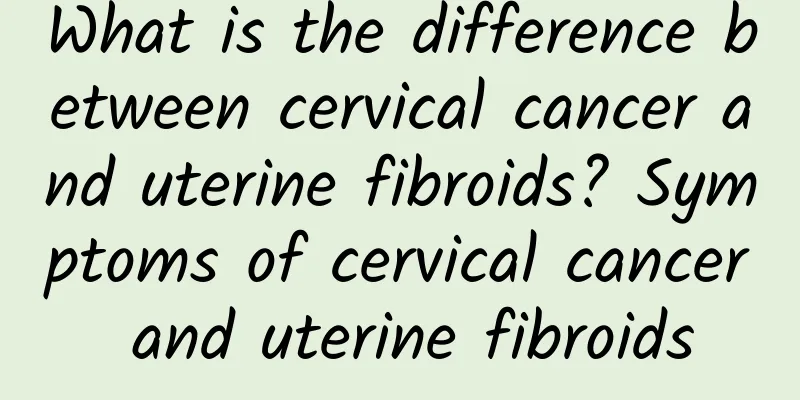What is the difference between cervical cancer and uterine fibroids? Symptoms of cervical cancer and uterine fibroids

|
Cervical cancer is one of the common malignant tumors in the female reproductive system, while uterine fibroids are a benign tumor. Although both diseases are related to the female reproductive system, there are obvious differences in their symptoms and treatment methods. The following will introduce the differences between cervical cancer and uterine fibroids and their symptoms in detail. 1. Definition and causes of cervical cancer and uterine fibroids 1.1 Cervical cancer Cervical cancer refers to the phenomenon that cervical epithelial cells undergo malignant mutations and spread rapidly. Cervical cancer is usually caused by human papillomavirus (HPV) infection. Long-term chronic cervicitis, multiple sexual partners, early marriage and early childbearing may also increase the risk of cervical cancer. 1.2 Uterine fibroids Uterine fibroids are a common tumor of the female reproductive system, usually formed by abnormal proliferation of smooth muscle cells in the endometrial myometrium. The specific cause of uterine fibroids is still unclear, but imbalance of hormone levels is considered to be one of the important factors in its occurrence. 2. Symptom Differences 2.1 Symptoms of cervical cancer In the early stages, cervical cancer usually has no obvious symptoms. As the disease progresses, you may experience symptoms such as: - Vaginal bleeding: including abnormally heavy and prolonged menstruation. -Dyspareunia: You may experience discomfort or pain during sexual intercourse. - Ectopic leucorrhea: Patients may experience increased vaginal discharge, abnormal color or odor. 2.2 Symptoms of uterine fibroids Symptoms of uterine fibroids are usually related to the size, number, and location of the tumors. Some common symptoms include: -Abnormal menstruation: such as excessive menstruation, prolonged menstruation, etc. -Pelvic pressure: As the fibroids grow, they may cause discomfort in the lower abdomen or pelvis. - Frequent urination or constipation: Large fibroids may press on the bladder or rectum, causing symptoms of frequent urination or constipation. 3. Differences in treatment methods 3.1 Treatment of cervical cancer Treatment for cervical cancer usually includes surgical removal, radiation therapy, and chemotherapy. Treatment may be a single therapy or a combination of therapies, depending on the condition. 3.2 Treatment of uterine fibroids For uterine fibroids with no symptoms or mild symptoms, doctors usually choose conservative treatment methods such as observation. However, for cases with obvious symptoms or other complications, surgical removal or drug treatment may be required. Although both cervical cancer and uterine fibroids have a high incidence in the female reproductive system, there are obvious differences between the two in terms of definition, cause, symptoms and treatment. Understanding these differences will help patients detect the disease in time and choose appropriate treatment options. Therefore, female friends should seek medical treatment in time when they find symptoms, receive professional diagnosis and treatment to avoid further development of the disease. |
<<: What can I do to check for uterine fibroids?
Recommend
Common harms caused by uterine fibroids
Uterine fibroids are a gynecological disease that...
5 weight loss tips to lose weight easily in winter
The key to losing weight is to develop healthy li...
What are the main symptoms of uterine fibroids?
Women in menopause must pay attention, because at...
Li Ying loves to eat grapes to lose weight. Anthocyanin promotes metabolism
In addition to their sweet and sour taste, grapes...
[Video version] Do coriander and carrots have a strange smell? Turn 6 kinds of "disgusting foods" into happy and delicious foods
"Boss, I want a bowl of rice noodles without...
One deep and one shallow is a sign of menstruation
Is the phenomenon of one dark and one shallow a s...
Let's analyze and introduce the causes of cervical hypertrophy
Patients with cervical hypertrophy want to know m...
How is ovarian cyst classified clinically?
In life, ovarian cysts are a common gynecological...
Why is muscle training so important? The key is that muscle is the "capital" for weight loss
I often say that "muscle is the foundation o...
The most effective way to care for vulvar leukoplakia
Vulvar leukoplakia has had a great impact on the ...
What are the causes of uterine adnexitis?
According to relevant medical research, adnexitis...
Which hospital is good for treating uterine effusion?
The appearance of uterine effusion troubles women...
Can pelvic inflammatory disease cause constipation?
Everyone knows that the treatment of pelvic infla...
What to eat for women with irregular menstruation
What should women eat if they have irregular mens...
What are the effects of adenomyosis on pregnancy at 30 weeks?
Adenomyosis is a common female disease. Patients ...









